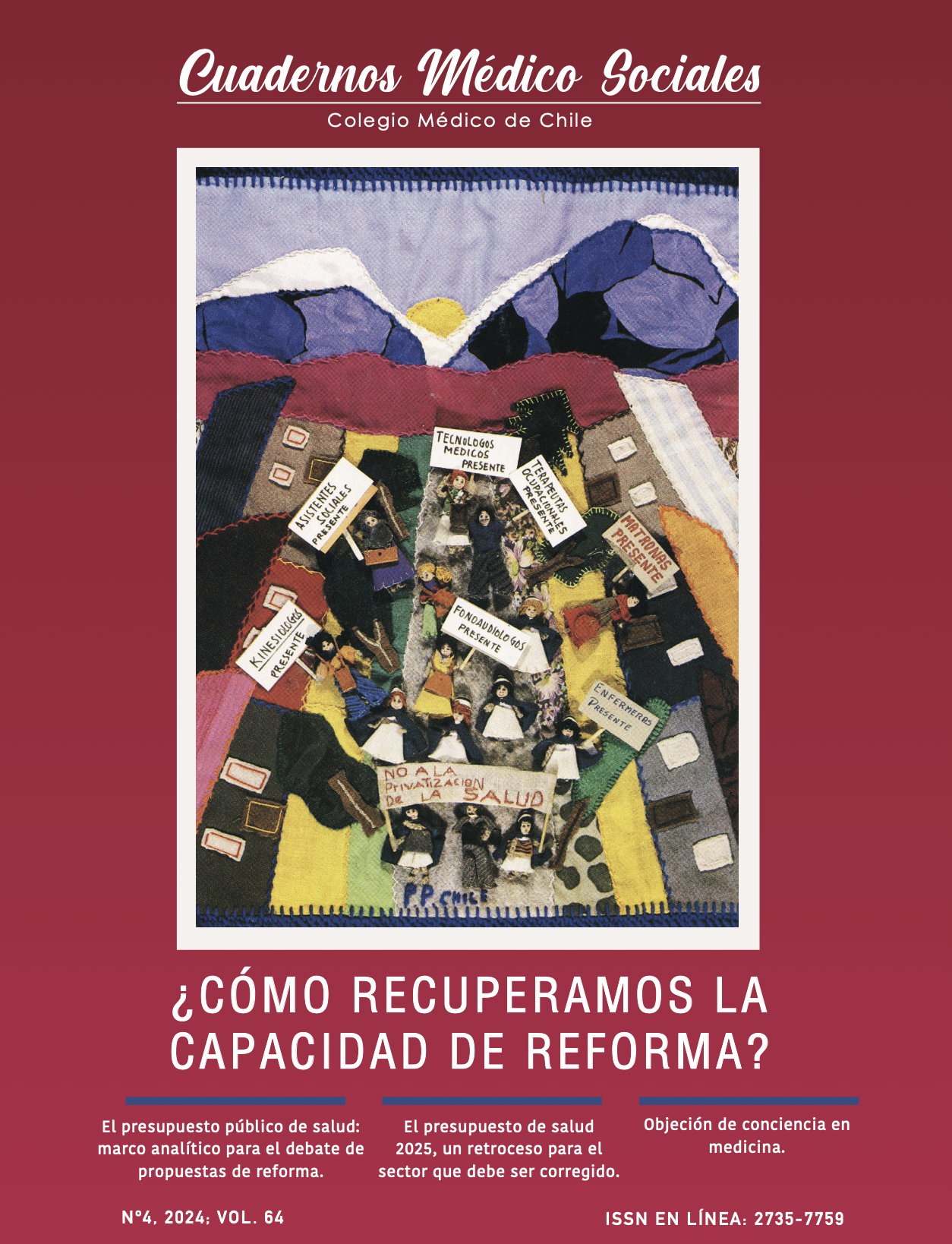Public policies, mental disorders, and patients’ human rights
DOI:
https://doi.org/10.56116/cms.v64.n4.2024.2022Keywords:
Public policies, Human rights, Psychiatric disorder, Duty to defend, Quality of psychiatric care, Investment in mental healthAbstract
A substantial number of people in Chile, probably millions, live with a diagnosable psychiatric disorder according to WHO criteria. It is a human right that such people have access to treatments that are effective, evidence-based, and provided with respect and compassion, especially given the fact that now the World Bank Chile considers as a high-income country. Those working in psychiatry and mental health, whether clinically or in national or regional government roles, have an ethical duty to advocate for the right to access the required treatments. Neither ideological debates nor therapeutic positions should hinder the exercise of this right by patients and their relatives.
Downloads
References
Asociación Medica Mundial (2022). Declaración de la AMM sobre la defensa del paciente y la confidencialidad. Adoptada por la 45ª Asamblea Médica Mundial Budapest, Hungría, octubre 1993. WMA. https://www.wma.net/es/policies-post/declaracion-de-la-amm-sobre-la-defensa-del-paciente/
Ministerio de Salud, Gobierno de Chile (2017). Plan Nacional de Salud Mental 2017-2025. http://www.repositoriodigital.minsal.cl/handle/2015/889
Ministerio de Salud, Gobierno de Chile (2021). Informe Encuesta Nacional de Salud 2016-2017. Salud Mental 2: Comportamiento Suicida. Subsecretaría de Salud Pública, División de Planificación Sanitaria, Departamento de Epidemiología. https://epi.minsal.cl/wp-content/uploads/2021/09/2021.09.28_Informe-Suicidio-ENS-2016-17.pdf (accedido el 24 de Junio de 1924).
Organization for Economic Cooperation and Development, OECD (2021). Health Statistics 2021. https://www.oecd-ilibrary.org/sites/9f6248d4-en/index.html?itemId=/content/component/9f6248d4-en
Organización Mundial de la Salud (s/f). CIE-11, Clasificación Internacional de Enfermedades, 11.a revisión: Estandarización mundial de la información de diagnóstico en el ámbito de la salud. Capitulo 6. https://icd.who.int/es
Our World in Data (2023). World Bank Income Groups, 2023. https://ourworldindata.org/grapher/world-bank-income-groups (accedido el 24 de noviembre de 2024).
Patel Vikram., et al. (2018). The Lancet Commission on global mental health and sustainable development. The Lancet, 392: 1553 – 1598
Soto-Lafoy S. (2021). No era depresión, era capitalismo: psicologización y control social. El quinto poder. https://www.elquintopoder.cl/salud/no-era-depresion-era-capitalismo-psicologizacion-y-control-social/
The National Collaborating Centre for Mental Health (2021). The Improving Access to Psychological Therapies Manual. Version number: 5. Updated: August 2021. First published: June 2018.
Vicente, B., Kohn, R., Rioseco, P., Saldivia, S., Levav, I., & Torres, S. (2006). Lifetime and 12-month prevalence of DSM-III-R disorders in the Chile psychiatric prevalence study. The American journal of psychiatry, 163(8), 1362–1370. https://doi.org/10.1176/ajp.2006.163.8.1362
World Bank Group (2023). Gini Index. https://data.worldbank.org/indicator/SI.POV.GINI?end=2023&start=2023&view=bar
World Health Organization (2012). WHO QualityRights Tool Kit. https://www.who.int/publications/i/item/9789241548410
World Health Organization (2021). Mental Health Atlas 2020. https://www.who.int/publications/i/item/9789240036703
Downloads
Published
How to Cite
Issue
Section
Categories
License
Copyright (c) 2024 Alvaro Barrera, Andrew Molodynski

This work is licensed under a Creative Commons Attribution-NonCommercial-ShareAlike 4.0 International License.


